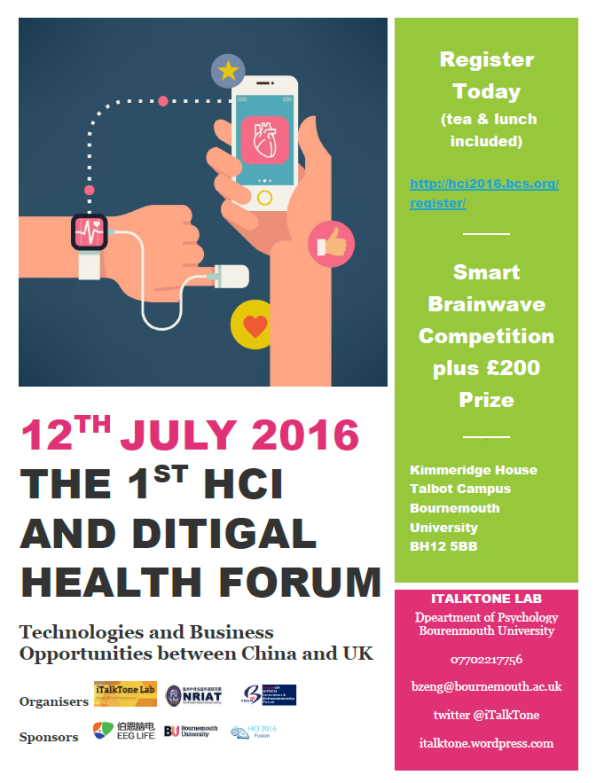Research and Education (CoPMRE), Bournemouth University, is pleased to announce the confirmed programme for the Thirteenth Annual Symposium, Digital Healthcare: Shaping the future. This symposium is suitable for primary and secondary care doctors, nurses and other healthcare professionals, Trusts board members, academics and anyone with an interest in medical research and education.
This year’s conference will explore the escalating scale and pace of digital technology in healthcare and the benefits and challenges of transformative technologies to advance care, improve clinical outcomes and enhance the patient experience.
The conference is free to attend but please register in advance to confirm your place.
Talks include:
- Why Digital Healthcare? The national context and strategy
Cathy Francis (Director of patients and information, NHS England) - Digital Healthcare and the Challenge of Interoperability
Theodoros N. Arvanitis (Professor of e-Health Innovation and Head of Research, Institute of Digital Healthcare (IDH) at WMG, University of Warwick) - Steps on the Dorset Digital Journey – The Dorset care record and beyond
Andy Hadley (Head of IT Development, NHS Dorset Clinical Commissioning Group) - Digital Clinical Pathways: harnessing the power of digital health service design
Nuno Almeida (Founder and CEO, Nourish) - Using technology to deliver mental health at scale
Claire Harding (Head of Impact and Research, Big White Wall)
The symposium agenda final-7812-copmre-annual-conference-a4-programme-19-09-16-v-2-7-1

 All documents, which are PDF files, are categorised into three themes: technologies, marketing and business cases. Especially, the business cases show an extremely booming EEG products market in China. It is very interesting the main force in this business is based in the city of Hangzhou, the hosting city for G20 2017 and the HQ of Alibaba.
All documents, which are PDF files, are categorised into three themes: technologies, marketing and business cases. Especially, the business cases show an extremely booming EEG products market in China. It is very interesting the main force in this business is based in the city of Hangzhou, the hosting city for G20 2017 and the HQ of Alibaba.
 To attend our forum(workshop) in Bournemouth University, you will tick the option of “Workshops (one day)” and pay the registration fee (the figure left). The registration fee is £100 which includes a lunch and refreshment. Also it is a one-off payment, you can choose to attend any workshop on 12th July.
To attend our forum(workshop) in Bournemouth University, you will tick the option of “Workshops (one day)” and pay the registration fee (the figure left). The registration fee is £100 which includes a lunch and refreshment. Also it is a one-off payment, you can choose to attend any workshop on 12th July. ave a live streaming conference in China. All talks will be broadcasted mutually in Bournemouth and China. Our partners Newford Research Institute of Advanced Technology (NRIAT) and China-UK Innovation and Entrepreneurship Forum are responsible for running China sessions in
ave a live streaming conference in China. All talks will be broadcasted mutually in Bournemouth and China. Our partners Newford Research Institute of Advanced Technology (NRIAT) and China-UK Innovation and Entrepreneurship Forum are responsible for running China sessions in 



 Dr Xun He
Dr Xun He


 Pete Read (CEO, Global Growth Market)
Pete Read (CEO, Global Growth Market)
